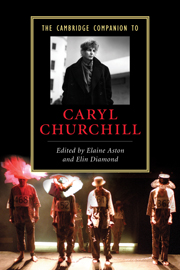Book contents
- Frontmatter
- 1 Introduction: on Caryl Churchill
- 2 On feminist and sexual politics
- 3 On owning and owing: Caryl Churchill and the nightmare of capital
- 4 On the challenge of revolution
- 5 On text and dance: new questions and new forms
- 6 On Caryl Churchill’s ecological drama: right to poison the wasps?
- 7 On performance and selfhood in Caryl Churchill
- 8 On Churchill and terror
- 9 On collaboration: ‘not ordinary, not safe’
- 10 On Churchill’s influences
- Select bibliography
- Index
8 - On Churchill and terror
Published online by Cambridge University Press: 28 March 2010
- Frontmatter
- 1 Introduction: on Caryl Churchill
- 2 On feminist and sexual politics
- 3 On owning and owing: Caryl Churchill and the nightmare of capital
- 4 On the challenge of revolution
- 5 On text and dance: new questions and new forms
- 6 On Caryl Churchill’s ecological drama: right to poison the wasps?
- 7 On performance and selfhood in Caryl Churchill
- 8 On Churchill and terror
- 9 On collaboration: ‘not ordinary, not safe’
- 10 On Churchill’s influences
- Select bibliography
- Index
Summary
Of all the jingoistic terms characterizing recent US foreign policy, the 'war on terror' has endured, not only because it refers to the unprovoked bombing of Baghdad on 19 March 2003, which led to a brutal and ongoing war, but because it is such an elusive and strange idea. At first it seemed that this was typical 'Bush-speak': meaning 'terrorism', the former president loosely and inaccurately said 'terror'. Yet the OED states that the provenance of 'terrorism' is the 'system of terror' introduced in the French Revolution, and that 'terror' derives from the far older Latin terrorum or 'the state of being terrified or greatly frightened'. Can war be waged on a system of terror and on the affective state of being terrified? Isn't war the cause of terror? Or is terror what feeds war? And what of terror when no war is in view? Since her earliest radio plays, Caryl Churchill has explored these questions, not as ancillary to but as deeply rooted in her work. She dramatizes a provocative slippage between terrorist act and terrorized affect and invites us to discern in her theatre a unique dramaturgy of terror, a shifting aggregate of formal decisions based on the media she writes for and the times she has lived, and is living, through. 'On Churchill and terror' will trace a long arc of representative plays, from The Ants (1962) and Objections to Sex and Violence (1975), to Softcops (1978), A Mouthful of Birds (1986), Thyestes (1994) and Far Away (2000) in order to map the key coordinates of Churchill's career-long concern with both systems and affect, with terrorism and terror.
- Type
- Chapter
- Information
- The Cambridge Companion to Caryl Churchill , pp. 125 - 143Publisher: Cambridge University PressPrint publication year: 2009
- 3
- Cited by

